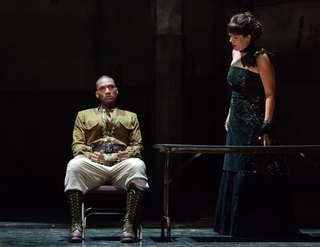|
Back
A war-torn Aïda Albany
The Alice Busch Theater
07/07/2012 - & July 13, 15, 23, 27*, August 4, 9, 11, 14, 17, 25, 2012
Giuseppe Verdi: Aida
Michelle Johnson (Aida), Daveda Karanas (Amneris), Noah Stewart (Radamès), Eric Owens (Amonasro), Phillip Gay (the King), Joseph Barron (Ramfis), Clay Hilley (Messenger), Lenora Green (High Priestess)
The Glimmerglass Festival Chorus, David Moody (Chorus Master), The Glimmerglass Festival Orchestra, Nader Abbassi (Conductor)
Francesca Zambello (Director), Lee Savage (set Designer), Bibhu Mohapatra (Costume Designer), Eric Sean Fogel (Choregrapher), Robert Wierzel (Lighting)

N. Stewart & D. Karanas (© Karli Cadel)
Every year Glimmerglass performs one of the operatic chestnuts and this year Francesca Zambello has taken on what is arguably the most operatic of all operas, Aida. The 900-seat Alice Busch Theater is, by North American standards, “too small” - but it is larger than the opera house that hosted its premiere (and there are lots of relatively small houses in Europe that perform it and other large scale works).
Overall, Ms Zambello’s approach borders on the outrageous, with a rather blingy high-fashion gloss in the costume design, and stage directions (for example, clenched-fist salutes) that border on the satirical. At times it brings to mind the recent comedy The Dictator, a send-up of Col. Gaddafi. What we see is a multi-racial militarist state under siege invading a neighbouring state (“Egitto” and “Etiopi” are just names - think the regimes of Bokassa, Mobutu, Gadaffi, al Assad...) and hauling back plunder, including a glittering chandelier. What makes it work is that the performers go at it with total sincerity. In many ways it is a more successful updating than the Canadian Opera Company’s more straitlaced production (2010) under Tim Albery’s direction in that it portrays elements of a post-colonial society in all its tacky squalor.
The one truly outstanding performance is Eric Owens as Amonasro - vocally and dramatically he comes across as an irresistable force of nature. The other main roles are taken by promising newcomers. Both Michelle Johnson (Aida) and Daveda Karanas (Amneris) are recent winners of the Metropolitan Opera National Council Auditions. Ms Johnson certainly has the pianissimo aspects of the role down pat while more hard-pressed moments were not as certain. Ms Karanas is more in the dramatic soprano mould (like, say, Ghena Dimitrova). Her voice tends to give a whooop at the top end - not always a bad thing given Amneris’s personality. She has the role of Brangäne coming up (in Toronto) and one looks forward to seeing what she can do with that.
Another promising singer in his role debut is Noah Stewart as Radamès. His opening aria, the notorious “Celeste Aida”, is probably the most picked-apart aria in the repertory. His rendition (performed against some rather intrusive stage business) also failed to achieve perfection (last achieved by whom? and where?), but was worthy nonetheless. He ably portrays a dashing, achingly ambitious young warrior.
One of the festival's Young Artists, Phillip Gay, lacks the usual gravitas as the King, but his youthfulness is fully in keeping with the updated milieu - many warlords achieve power at a young age. (He definitely seems too young to be the father of Amneris, however.)
The conductor is Nader Abbassi, music director of the Cairo Opera, which can almost be said to “own” the work. At times I wished for a bit more orchestra - a few more string players would add a degree of richness. His approach takes great care with the intimate scenes which, after all, occupy most of the opera. The men’s chorus deliver some extremely fine pianissimo moments.
The action is tightened a bit by some judicious cuts in the ballet sequences. What ballet does remain is ably performed by choristers.
One wonders whether an urban-based company would take up the director’s edgy vision of a work that so many have fixed in their minds with all the King Tut visuals, animals, etc (all of which makes for a great show). Given Francesca Zambello’s powers of persuasion, I wouldn’t be surprised to see her vision transplanted elsewhere.
Michael Johnson
|